Anarchist Studies
Reflections on the ASN8 conference – looking back/forward

From Anarchist Studies
Early September in Belfast can be surprisingly sunny and balmy. It was so sunny even, that the closing plenary after three days of conferencing at Ulster University happened outside, in the sunshine – providing a physically open space as an opportunity for open dialogue between all participants. During the plenary, there were some initial reflections on the 8th edition of the conference, as well as some first promising ideas for the next edition.
Belfast was a rather appropriate place for a conference on the theme of ‘anarchism in/with/as/beyond conflict’. The wider region experienced a 29-year long conflict known as ‘The Troubles’ (quite the understatement!) which is still tangible today when walking the streets of Belfast. Still present are the ironically named ‘peace walls’, erected from 1969 onwards to separate communities on the basis of their supposed sectarian fealty (along the reductively binary lines of Catholic/Irish/nationalist/republican versus Protestant/British/unionist/loyalist) – there are now more than 100 of them across the city. Indeed, some of these walls have had fences added to increase their height (to prevent projectiles being thrown over), whilst many of the gates between the two areas remain locked from the early evening until morning. Does this mean that the city is still in conflict? Or is the region beyond conflict? Or do people simply live with conflict? Those are questions to ponder on, over an Irish stout maybe, in one of the several venues that played host to our members (The Sunflower, and Ulster Uni Art Shop, amongst them).
For now, we as conference organisers want to take the opportunity to use the lens of that overarching theme to share some of our personal reflections, to engage with some ideas and comments we received from participants, and to offer a few general thoughts and questions on next steps. We hope that this will start a productive conversation around ways to improve the conference, and, as usual, we are open to any level of engagement from you.
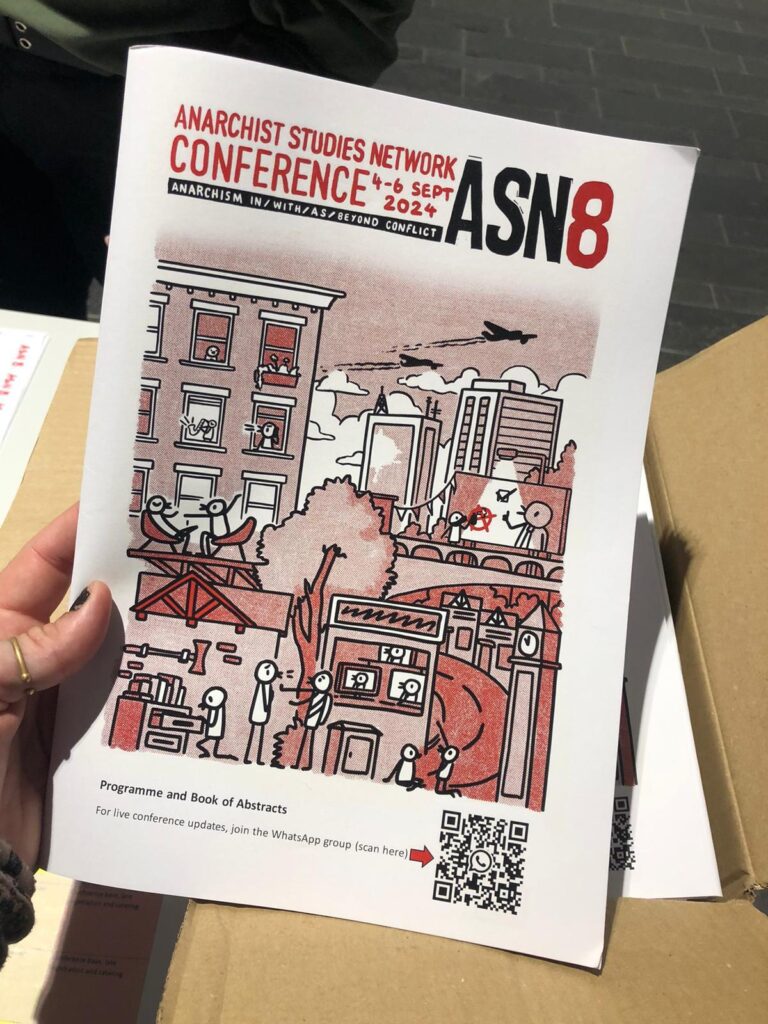
With conflict: to conference or not to conference?
As co-organiser Elizabeth Vasileva also already mentioned in her preliminary conference reflections, much can be said about the purpose of an academic conference and whether or not it makes sense for the Anarchist Studies Network to organise one. It remains useful to have this debate and differing views are welcome. For this 8th edition, we aimed for a subversive and thought provoking convergence between academia and a DIY approach. Aside from presentations and talks there were also opportunities for social gatherings, and Do-It-Yourself conference slots were kept open. But, it’s worth stressing that the academic aspect of the programme is purposeful. The ASN is a Specialist Group of the Political Studies Association (in the UK) which gives Anarchist Studies a ‘legitimate’ place in academia and also provides (minimal) funding to support anarchist academics in organising our activities – this includes, but is not limited to, the biennial ASN conference. There are not many obvious opportunities to share academic knowledge and work on anarchism and, where these are carved out, we try to cherish them. This 8th edition fulfilled that purpose and gave space and time for people to share, question, and contemplate their own and each other’s work with that specific academic focus. This isn’t an exclusively introspective exercise – activist voices and lived experience formed the grounding for many of the critical exchanges. But we recognise that theory holds a significant place within broader anarchist praxis.
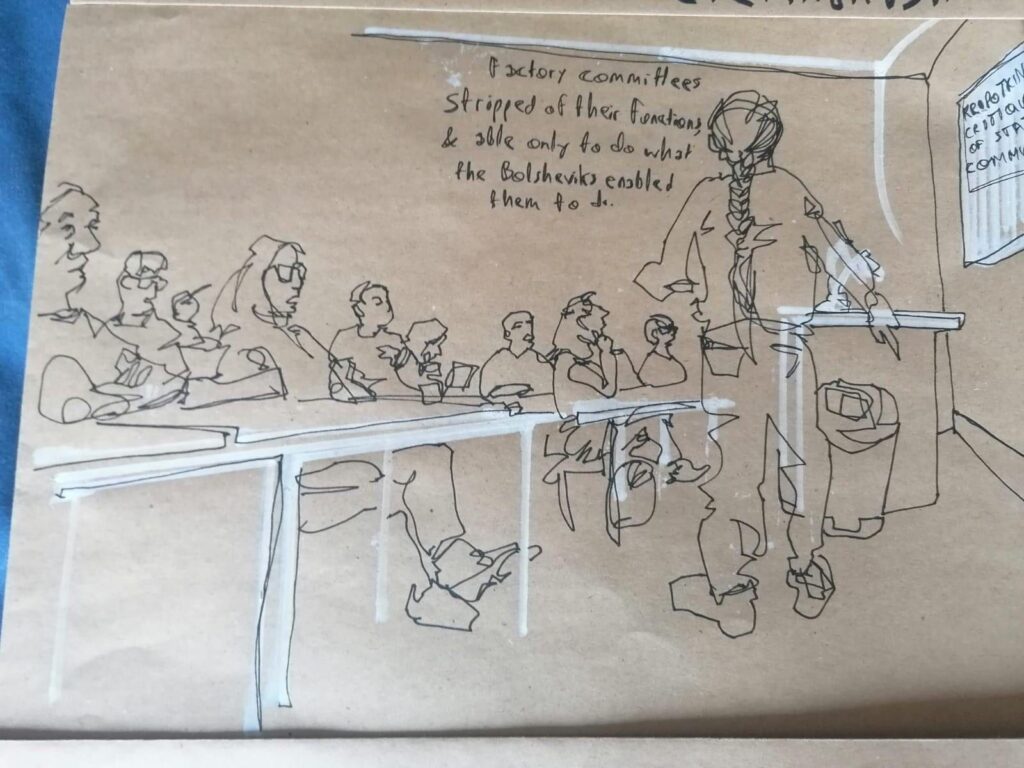
While we effectively subvert the format where we can, the set-up of ASN remains that of an academic conference. With all acknowledgement of the ‘ivory tower’ baggage, this is a space for rigorous critical thinking and a place to have one’s work scrutinised. A conference is a distinct space from other anarchist gatherings (anarchist book fairs, social centres, and other events where we might meet and discuss ideas), and while there is always more that we can do to push the boundaries of what that academic conference space looks and feels like, it cannot ultimately escape ‘academia’ (nor do we want it to).
There are limits to academic conferences and some of them are particular to the format and some are particular for anarchists. Because of time constraints, the conference is very fast-paced with overlapping panels. Other limitations come from the fact that academia, and anarchism in the UK, are both overwhelmingly white, middle-class, male-dominated spaces – diversity is difficult to achieve. While we put a lot of effort into outreach, and always prioritise financial sponsoring of under-represented groups, more work is still needed. But, that said, the conference has massively diversified in the last ten years and now hosts female-only panels, non-binary presenters, children and disabled people, alongside international participants from the Global South who wouldn’t have been able to come without support. Whilst this is a step forward, it is important to recognise that black and PoC groups from the UK still find it hard to penetrate these spaces and more work needs to be put into ensuring they feel welcome. This opportunity for convivially critical and deeper dialogue with other anarchists or anarchist-adjacent participants should be recognised for its unique contribution, while we push the limits of what it can become.
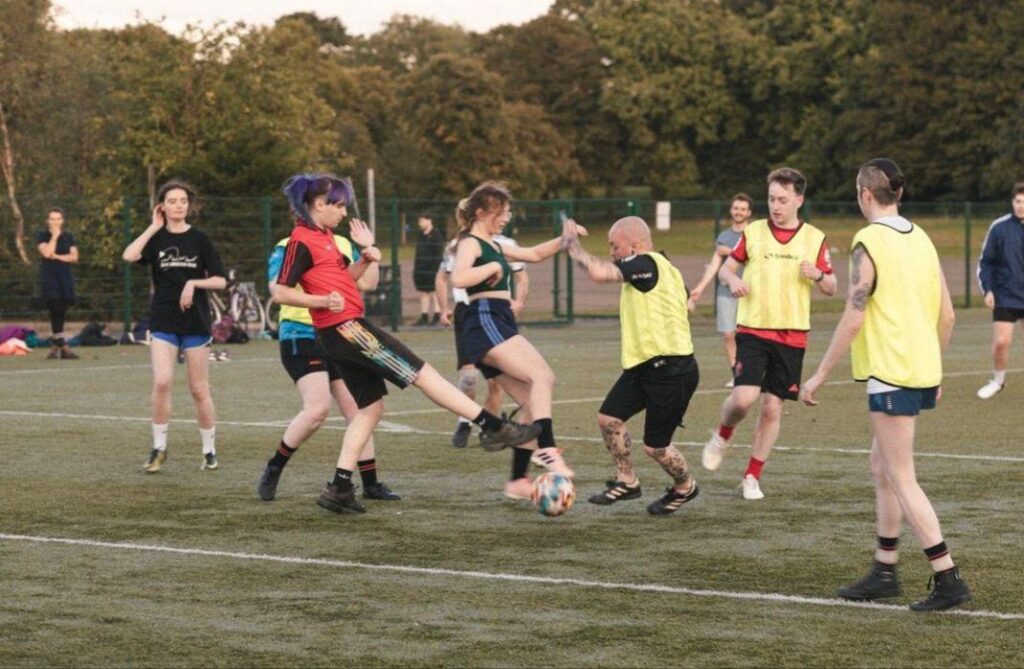
As for the social aspects of the conference, we enjoyed seeing many familiar faces, but also many new faces (including several first-timers on the organising team: Elke Van Dermijnsbrugge, Luke Ray Di Marco Campbell, Cassidy Ferrari, and David Fox). This shows that the conference continues to reach a wide (and new) audience! The social events gave us all the opportunities to mingle in a range of contexts – some more physically exerting than others. We joined Friendly Street F.C. at Ormeau Park for training and a nine-on-nine match. We had a pre-conference pub social and a second pub gathering, accompanied by live Irish folk tunes. We had an ‘intentional listening’ session, scoffing copious quantities of vegan pizza while hearing the raucous punk emanating from Belfast, Banda Aceh and Kosovo as part of the Failed States//Creative Resistances compilation project. We value these events, and also appreciate the spontaneous socials organised by attendees (in true anarchist fashion), because they make the conference a more spontaneous space, more aligned with our DIY ethos, and far more than just an academic programme.
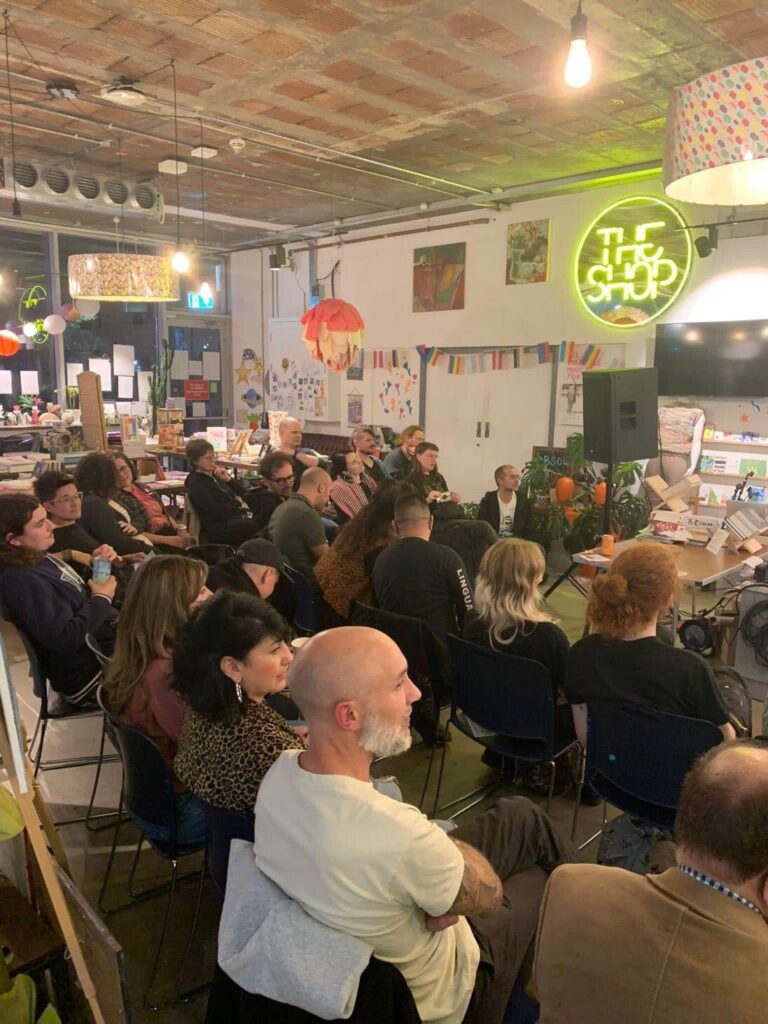
As conflict: inclusivity, a shared responsibility
In this 8th edition, we had quite a range of presenters: from early career researchers to activists and academics from a range of disciplines, as well as more unexpected ones like children! We want to offer every interested party an opportunity to share work, whether it is published or not, to get inspired, and be challenged as well as encouraged by the audience. Across all panels with very diverse themes and perspectives, both online (2nd September) and face-to-face (4th-6th September), we saw a lot of input and engagement from the audience, going from challenge to affirmation to provocation.
As organisers, we’ve been reflecting on how tightly we should moderate Q&As. Moderators are not there to censor questions, but to ensure respectful dialogue and time-keeping. Ultimately, people’s behaviour is their own and, collectively, everyone is responsible for creating the space together. Some people see academic jargon as exclusive while some people thrive on it because of the clarity of expression it brings – there is a challenge to find a shared ground for understanding each other. Taking responsibility for creating the space together means sometimes accepting that one doesn’t understand, or is not understood, and doing something about it. This is something that we could have addressed more at the beginning of the conference, and next time we would encourage participants to work more on a common understanding of how we might share the space (because some people took up too much space this time around, to be perfectly frank).
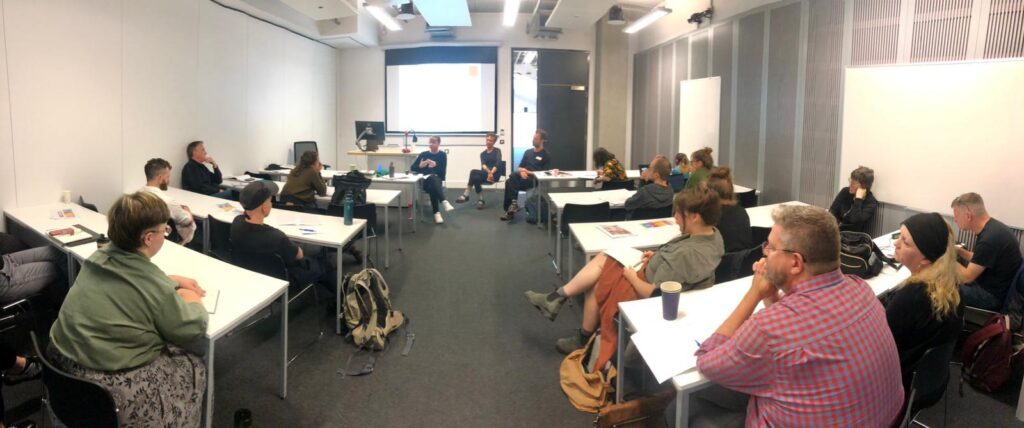
In conflict: location matters
As mentioned at the start, Belfast was an appropriate place in relation to the conference theme. This location, however, also had downsides and logistical challenges. While the hosting of a first ASN conference outside Britain might be understood as a decolonising gesture, Northern Ireland remains part of the United Kingdom. The particularly harsh border regime of the UK Government meant that a significant number of would-be attendees were refused visas to enter for the in-person events, impoverishing the diversity of the conference as a whole. On the other hand, being in the north of Ireland meant an additional travel burden for people arriving from Wales, Scotland and England. There were a good number of attendees from previous (Loughborough-based) iterations of the conference who made the effort to come to Belfast, but there were a number of notable absences too.
Funding was available to help with travel (and associated) expenses, and we were glad to welcome in-person attendees from Pakistan, Kosovo, Finland, the US, India, Italy, Greece, Iceland, Canada, France, Britain, and Ireland (north and south),
The geographical location and venue(s) of the conference very much depend on the cost and the availability of rooms. As it is an academic conference, ASN organisers have usually tried to find a hosting university that does not charge us (too much) for room use, is accessible in a range of ways, and allows us to DIY (in other words: does not force us to use lanyards or to pay for expensive catering, and the likes!). The organising team members based at Ulster University ensured a degree of familiarity with the space and an ‘in’ to accessing an abundance of resources that aided the running of the event (in-house projectors, charger ports, computers, water fountains etc.). Existing relationships with colleagues at The Art Shop enabled attendees to share or sell their own literature (pamphlets, books, and materials) without having to staff a table, so they could get on with participating in conference events.
However, the space was, at times, challenging to navigate. Across the three-day in-person event, at least four other conferences were also taking place in the same building, whilst the Friday turned out to be an Open Day event for local high school children. These brought many hundreds of other people to the same space, creating quite a loud environment within which capitalist innovation reminded us how thin and non-soundproof fold-down room dividers are, and the craven extents to which universities will go to attract a young crowd. For anyone wondering, this included blaring techno music throughout the building, hosting multiple food trucks at the venue entrance (congesting access), and occupying much of the foyer with selfie stands. We shit you not.
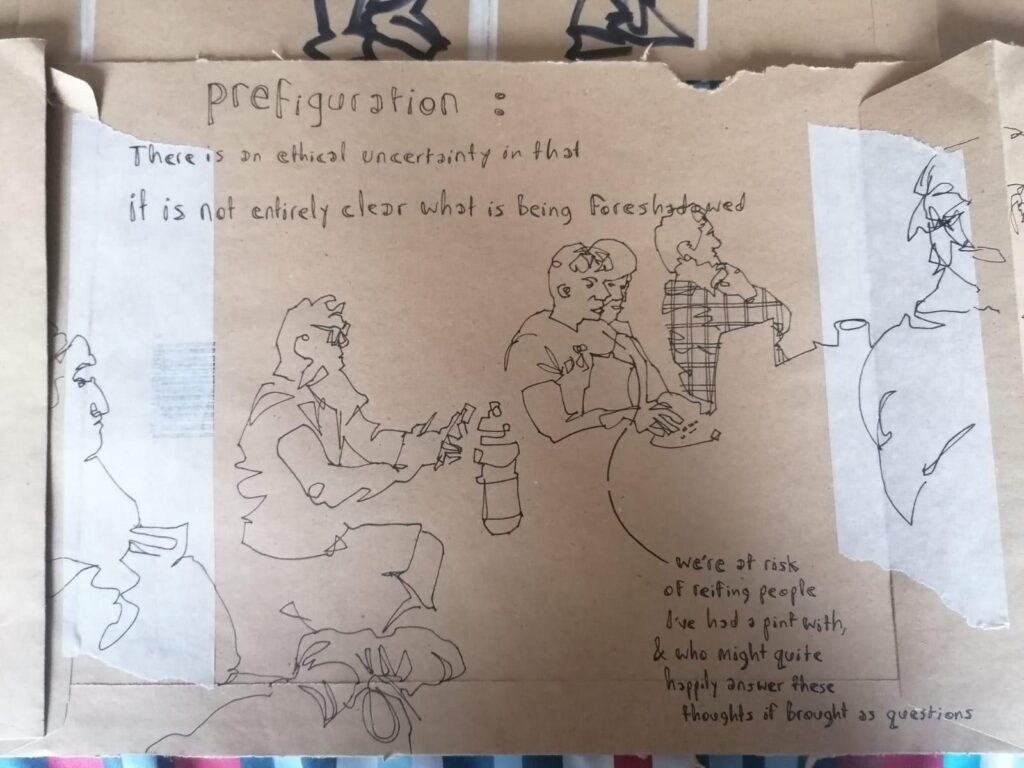
Despite the challenges, we would argue that running the event in these conditions was better than the alternative of not doing it, or of paying huge costs to hire a private venue. Reflecting on this, however, means accepting that the space is not ‘ours’ and, consequently, far from ideal. It is, however, a resource we can tap into without (or with minimal) costs. To run academic events (whatever changes we are enacting to the traditional formats), we all stand to benefit from access to the equipment in-built at many universities. Thus, when we hold the necessary connections within the ASN to access these without significant restrictions, why not carve out our own nook at Ulster or any other campus? If you see opportunities to host any of the future conferences at your institution, get in touch!
This year, we chose to have one online conference day before the physical conference, to offer an opportunity to participate and/or present to those who were not able to travel. Apart from a few minor tech hiccups with stroppy Zoom links, the day went well and we had an active and engaged audience across the different panels. This is one positive thing we learnt from the pandemic: online conferences can be constructive! We would like to reiterate what comrade Elizabeth wrote in the preliminary conference reflection:
‘Despite our excitement to be back to in-person events, we really wanted to preserve the element of enabling participants who couldn’t physically attend (because of space, borders, ability, other commitments) established during the previous two conferences. Virtual participation has now become a matter of accessibility, as many activists have pointed out since the pandemic, and is something which we are committed to.’
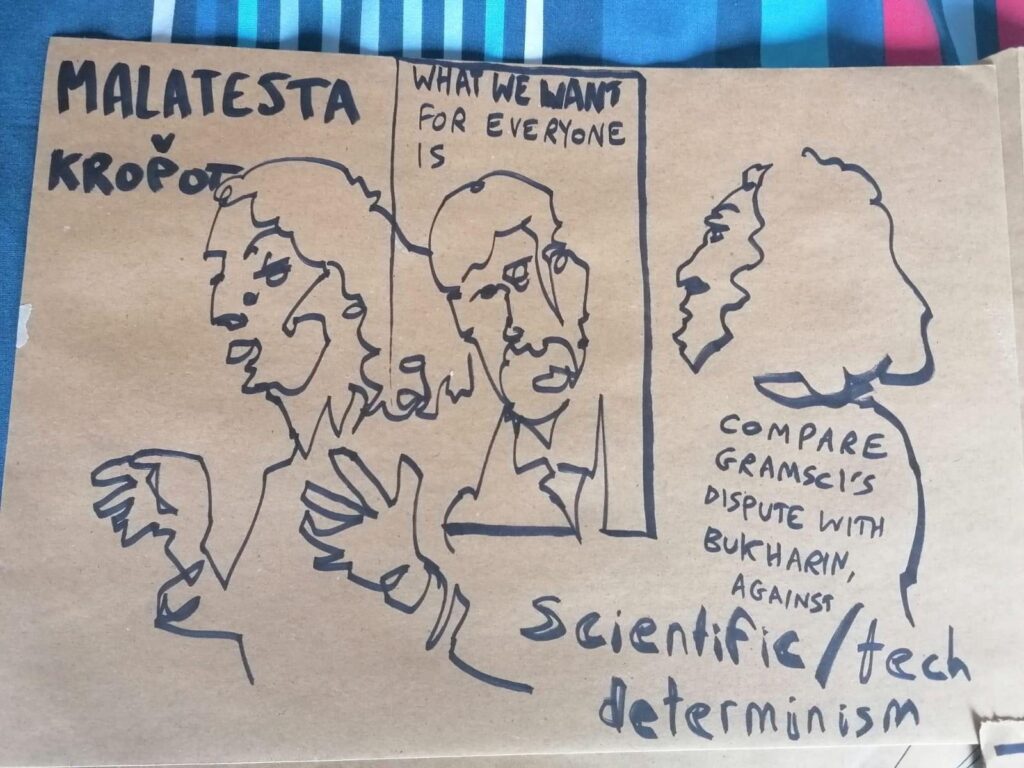
Beyond conflict: where to next?
The final plenary of the conference ended up, as usual, with a few proposals on next edition’s theme. Anarchism: More-Than-Human generated the most enthusiasm and is likely to be the chosen one for ASN9 in 2026. Location is yet to be confirmed, but, again, we are looking for a free and accessible space anywhere in the world (with a local crew to help organise). We know it’s a long wait, and given that there are two whole years in between, we are hoping that ASN members will step in and propose some mini-events we can do next year.
Please reach us on asn.conference@protonmail.com for comments, thoughts and ideas!